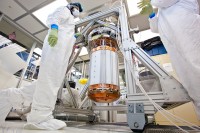Results from a search for dark matter in the complete LUX exposure.

The Large Underground Xenon (LUX) dark matter experiment, which operates beneath a mile of rock at the Sanford Underground Research Facility in the Black Hills of South Dakota, has completed its search for the missing matter of the universe – one of the most sought for goals in physics and astronomy. Final results are published in Physical Review Letters, with an editorial comment to highlight their significance.
Since 2013, the experiment has led worldwide direct searches for dark matter, in which evidence for the scattering of dark matter particles in a terrestrial detector is sought. The final result from the 2014-2016 run, recently accepted for publication in PRL, pushes the sensitivity of the instrument to a final performance level that is 4 times better than originally expected, and a further improvement on its existing world lead. Despite seeing no sign of a signal, the results rule out large fractions of the theoretical parameter space, constraining tightly the nature of dark matter.
Data analysis continues, searching for other possible rare signals in the data. The instrument itself is now being decommissioned and removed from the deep underground laboratory, in preparation for installation of its successor, LUX-ZEPLIN. Expected to begin taking data in 2019, this instrument is over twenty times larger, and expected to be over a hundred times more sensitive still. The University of Edinburgh is one of the leading institutions in LUX, contributing the Executive Chair of the collaboration, and is a participant in LZ.
These results reflect that LUX is now some twenty times more sensitive to dark matter than any of its predecessors. While if Nature had been kinder, we might have made a discovery, our results have greatly narrowed the possibilities for what dark matter might be - itself an important result. A new generation of experiments are now coming online or being built, including our own LUX-ZEPLIN. The search for dark matter remains a top priority. Says Prof Alex Murphy, The University of Edinburgh

